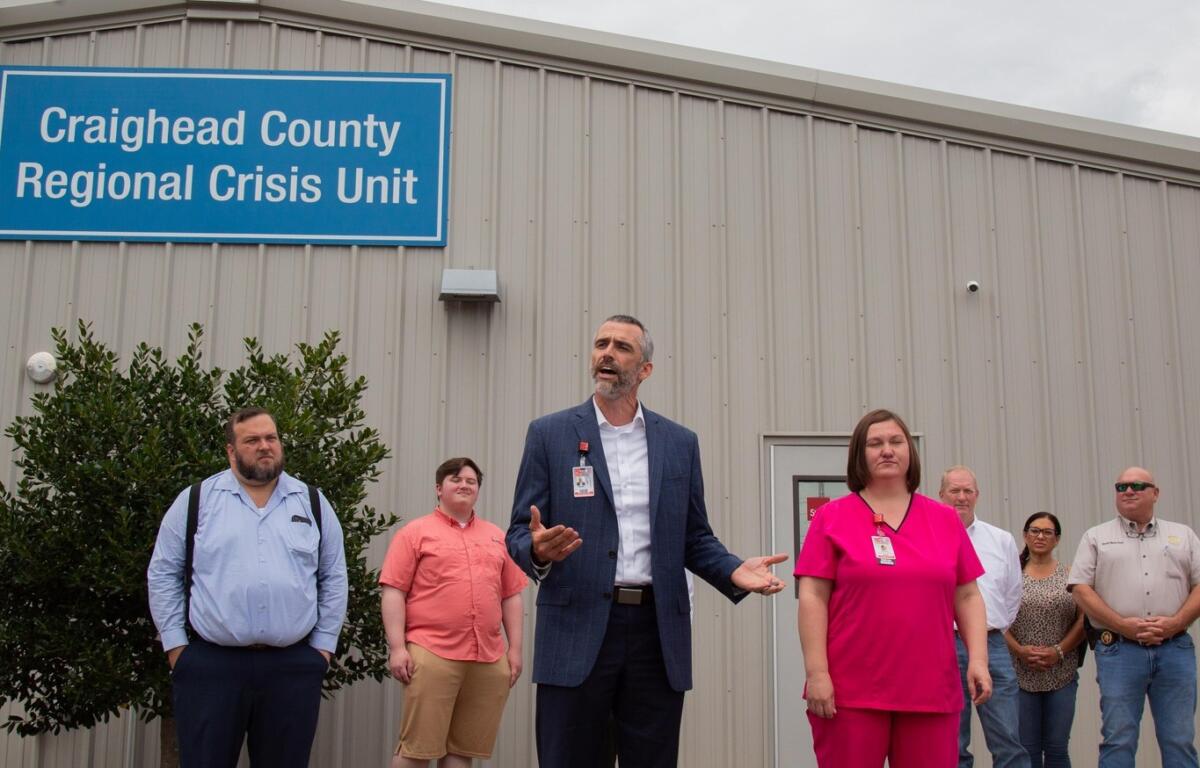Jonesboro, AR – (JonesboroRightNow.com) – July 16, 2024 – As our mental health crisis continues, it’s important to be able to refer those who need help to the right resources. If we don’t know how to help people, we might not reach out. Often, those go to the emergency room for help, but even then, where do they go from there? How can they be equipped with the right resources? Luckily, St. Bernards Healthcare has partnered with The Craighead County Regional Crisis Stabilization Unit to help answer some of these questions.
St. Bernards Healthcare embarked on a crucial partnership with Craighead County that started in October 2021, establishing a beacon of hope for individuals in crisis through their Regional Crisis Stabilization Unit (CSU). Located at 837 Willett Road, the CSU stands as a pivotal resource for those in Craighead County, offering sanctuary and specialized care for those grappling with acute behavioral health challenges. This facility is one of only three of its kind in Arkansas and provides a vital alternative to conventional settings like jails and emergency rooms, aiming to deliver prompt, tailored assistance in a compassionate environment.
When individuals arrive at the CSU, a dedicated team strives to initiate support within five minutes. A comprehensive assessment by a nurse and psychiatric provider ensures that each person receives the most appropriate care path, whether for mental health disorders, substance abuse issues, or a combination.
The focus of the CSU is on swift intervention and stabilization. A multidisciplinary team comprising psychiatric APRNs, mental health therapists, registered nurses, and social workers offers round-the-clock support.
Should a higher level of medical intervention be necessary, options like referral to the emergency department or St. Bernards Behavioral Health are readily available, prioritizing immediate needs and safety.
Beyond immediate medical and therapeutic care, individuals are provided with basic amenities such as food, shelter, and clothing, fostering a sense of security crucial to recovery. Moreover, dedicated social workers assist with essential tasks like Medicaid enrollment and securing housing, recognizing the broader social determinants impacting mental health.
The ethos of the CSU revolves around voluntary admittance and respect for individual autonomy. Here, individuals can find solace in a relaxed setting, engaging in activities like card games, watching TV, or simply enjoying a moment of respite with a cup of coffee. While mobile devices are restricted to safeguard privacy, communication with loved ones is encouraged, acknowledging the pivotal role of personal connections in the healing process. Not only that, but patients are followed-up with after discharge, which is a critical key in sustained success long-term.
We checked in with Mitchell Nail, Media Relations Manager at St. Bernards Healthcare, to ask what “follow up” means.
“After someone leaves, we follow-up within 48 hours, checking in again after 7, 14 and 30 days. We ask questions like, “What do you need?” “Do you have transportation or housing problems?” “Do you have access to your medications?” Ultimately, we want each person who leaves the CSU to find the right track after a crisis, whatever the situation.”, says Nail.
This comprehensive approach highlights St. Bernards’ dedication to supporting individuals through the entire recovery journey, offering not just immediate crisis intervention but also long-term stability and well-being.
“Most recently, we opened the St. Bernards Recuperative Care Program within the CSU. This program uses four of the CSU’s 16 beds to help patients without housing leave the hospital with a place to go,” says Nail. “The Recuperative Care Program then begins helping these patients find gainful employment, housing, transportation, clothing and other needs over a 30, 60 or 90-day period. At some point, we hope to get this program its own 16 to 20-bed building to accommodate our current needs and the needs of the CSU.”
They plan to add four recliners in the CSU’s entry room that let people who do not want to stay overnight get help during the day. They can eat meals, relax, watch TV and see a healthcare professional.
Nail continues, “We encourage people to call 870.393.5335 before coming to the CSU, but we also welcome people who arrive unannounced. Someone may also call 988 to access the mental health emergency hotline. As always, the emergency room is a safe place to go if someone does not know where to go or who to turn to.
“Most importantly, we want to help, whatever the physical, mental, emotional or spiritual need may be. Do not suffer alone. Recovery is a process, but there are so many options to get help. Contact us day or night.”




